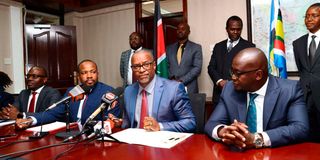Unlock community land value in frontier counties

From left: Kenya Bankers Association Representative Raymond Menje, Ministry of Lands Principal Secretary Nixon Korir, Ministry of Lands Cabinet Secretary Zachariah Njeru and Law Society of Kenya President Eric Theuri addressing journalists during a joint memorandum presser by the State Department for lands and physical planning and the Land Sector players on transitional measures to allow registration of Long-term leases during the Geo-referencing of the properties at Ardhi House, Nairobi on August 3, 2023.
The Community Land Act, 2016 came into force on September 21 that year, repealing Land (Group Representative) Act Chapter 287 of the Laws of Kenya (popularly known as Group Ranches and Trust Land Act (Cap. 288) and giving effect to Article 63 of the Constitution, which provides for classification of “Community Land”.
Three issues come to the fore: Recognition, protection and registration of community land rights; management and administration of community land; and the role of county governments in relation to the unregistered community lands and related issues.
Whereas many group ranches—largely in Narok, Kajiado, Laikipia, West Pokot and Baringo counties—transited and managed to register both the communities and the community lands, the northern frontier counties, including Mandera, are at Ground Zero. The issue of land ownership, governance and registration processes have been long-standing challenges before the Community Land Registration Act came into force.
The frontier counties face many, huge challenges in regard to community land registration processes; lack of land registrars; poor land governance; land tenure issues; absence of ownership documents; and rampant land grabbing of unregistered community land by both private and public entities.
Slow and cumbersome
The challenges are compounded by, one, low budget for the county departments of lands. Two, the community land registration process is slow and cumbersome. Three, shortage of land registrars results in delayed and inefficient land registration processes, hindering community land rights. Four, weak land governance structures have allowed for land-related disputes, land grabbing and lack of transparency in land management.
Five, absence of clear land tenure systems leaves communities vulnerable to land dispossession. Six, many community members lack proper land ownership documents, making it difficult for them to access credit, secure their lands or engage in meaningful development activities. Seven, both private and public entities have taken advantage of the lack of land registration and governance to perpetuate landgrabs.
Viable interventions may include political commitment. The counties must prioritise land reform, including allocating resources and political will to streamline community land registration processes. They should advocate legal reforms at the national level to simplify and expedite community land registration processes while ensuring that local land tenure systems are recognised and protected.
The national and county governments and development partners should facilitate capacity building, invest in training and hire more land registrars and other land management professionals to accelerate land registration and enhance land governance.
The authorities should also conduct robust public awareness campaigns to educate communities about their land rights and the importance of registering their land. Also empower communities to actively participate in land management and decision-making processes, enabling them to protect their land from encroachment.
They should collaborate with non-governmental agencies to facilitate the registration of community lands and resolve land disputes. Options include using alternative justice systems while seeking partnerships with development organisations and donors to secure funding for land registration initiatives and capacity building programmes.
Integrating the Ardhi Sasa portal with other modern land management technologies such as Land information management systems (LIMS) and Geographic Information Systems (GIS) can help to improve land records and transparency in the arid and semi-arid lands (ASALs).
Mr Alio is the County Executive Committee Member for Lands, Physical Planning, Housing, Urban Development, Circular Economy, Solid Waste Management and Sanitation in the County Government of Mandera. [email protected].





